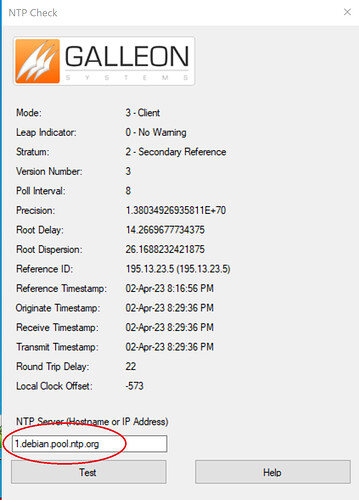ubuntu:
dig 1.debian.pool.ntp.org
; <<>> DiG 9.18.1-1ubuntu1.3-Ubuntu <<>> 1.debian.pool.ntp.org
;; global options: +cmd
;; Got answer:
;; ->>HEADER<<- opcode: QUERY, status: NOERROR, id: 65170
;; flags: qr rd ra; QUERY: 1, ANSWER: 2, AUTHORITY: 1, ADDITIONAL: 1
;; OPT PSEUDOSECTION:
; EDNS: version: 0, flags:; udp: 65494
;; QUESTION SECTION:
;1.debian.pool.ntp.org. IN A
;; ANSWER SECTION:
1.debian.pool.ntp.org. 0 IN CNAME fritz.box.
fritz.box. 9 IN A 192.168.178.1
;; AUTHORITY SECTION:
fritz.box. 9 IN NS fritz.box.
;; Query time: 11 msec
;; SERVER: 127.0.0.53#53(127.0.0.53) (UDP)
;; WHEN: Sun Apr 02 21:23:54 CEST 2023
;; MSG SIZE rcvd: 103
raspbian:
dig 1.debian.pool.ntp.org
; <<>> DiG 9.11.5-P4-5.1+deb10u8-Raspbian <<>> 1.debian.pool.ntp.org
;; global options: +cmd
;; Got answer:
;; ->>HEADER<<- opcode: QUERY, status: NOERROR, id: 4444
;; flags: qr aa rd ra; QUERY: 1, ANSWER: 1, AUTHORITY: 0, ADDITIONAL: 1
;; OPT PSEUDOSECTION:
; EDNS: version: 0, flags:; udp: 1232
;; QUESTION SECTION:
;1.debian.pool.ntp.org. IN A
;; ANSWER SECTION:
1.debian.pool.ntp.org. 0 IN CNAME fritz.box.
;; Query time: 2 msec
;; SERVER: 192.168.178.15#53(192.168.178.15)
;; WHEN: Sun Apr 02 21:24:40 CEST 2023
;; MSG SIZE rcvd: 73
pihole log entry:
2023-04-02 21:24:40 A 1.debian.pool.ntp.org raspbian.fritz.box OK (cache) CNAME (0.1ms)
No, it is currently without IP, the exact content of the configuration:
cname=0.android.pool.ntp.org,fritz.box
cname=0.debian.pool.ntp.org,fritz.box
cname=0.europe.pool.ntp.org,fritz.box
cname=0.irobot.pool.ntp.org,fritz.box
cname=1.android.pool.ntp.org,fritz.box
cname=1.debian.pool.ntp.org,fritz.box
cname=1.europe.pool.ntp.org,fritz.box
cname=1.irobot.pool.ntp.org,fritz.box
cname=1.pool.ntp.org,fritz.box
cname=2.android.pool.ntp.org,fritz.box
cname=2.debian.pool.ntp.org,fritz.box
cname=2.europe.pool.ntp.org,fritz.box
cname=2.irobot.pool.ntp.org,fritz.box
cname=3.android.pool.ntp.org,fritz.box
cname=3.debian.pool.ntp.org,fritz.box
cname=3.europe.pool.ntp.org,fritz.box
cname=3.irobot.pool.ntp.org,fritz.box
cname=ntp.airable.io,fritz.box
cname=ntp.msn.com,fritz.box
cname=time-a.nist.gov,fritz.box
cname=time-b.nist.gov,fritz.box
cname=time-nw.nist.gov,fritz.box
cname=time.akamai.com,fritz.box
cname=time.android.com,fritz.box
cname=time.nist.gov,fritz.box
cname=time.windows.com,fritz.box
cname=ntp.ubuntu.com,fritz.box
cname=tablet.ntp-fireos.com,fritz.box
cname=ftv-smp.ntp-fireos.com,fritz.box
